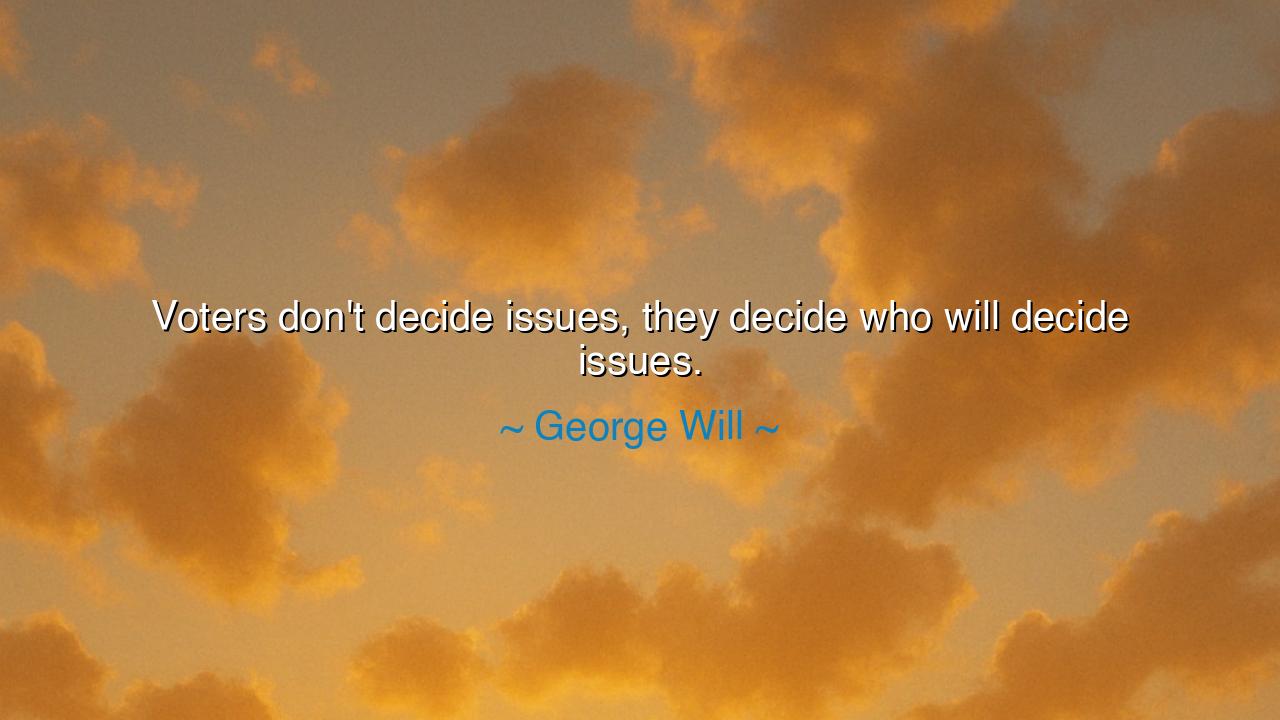
Voters don't decide issues, they decide who will decide issues.






George Will, the sharp-tongued commentator of politics, once declared: “Voters don’t decide issues, they decide who will decide issues.” In these words lies a piercing truth about the nature of democracy. The people, in their ballots, do not directly shape every law or decree; instead, they choose the stewards of power, the guardians who will deliberate, argue, and resolve on their behalf. Thus, the act of voting is not the end of politics, but the beginning, for it entrusts the fate of countless unseen battles to chosen representatives.
The origin of this saying is rooted in the observation of representative government. In a republic, it is impossible for the people themselves to decide every matter of war, taxation, and law. Instead, they place faith in others to carry their will into the chambers of authority. Will, with his gift for stripping illusions, reminds us that elections are less about specific issues and more about trust: who among us is wise enough, steadfast enough, and just enough to hold power on our behalf?
History bears this truth clearly. In ancient Athens, though celebrated as a direct democracy, many decisions were still entrusted to leaders chosen by the people. Pericles, elevated by the votes of citizens, became the voice of Athens, steering it toward glory and war. The citizens did not decide each detail of policy; they chose Pericles to decide. His greatness—and his errors—proved that the destiny of a nation rests not only in issues, but in the character of the ones chosen to decide them.
So too in America, the election of Abraham Lincoln in 1860 carried within it no single vote on secession or emancipation. The people did not decide those questions at the ballot box; they decided upon the man who would face them. Lincoln’s wisdom, patience, and moral courage determined the course of the republic. Here is the full force of Will’s insight: that the heart of voting lies not in policy detail, but in the leaders entrusted to navigate storms yet unseen.
Therefore, O children of democracy, take heed. Do not treat elections lightly, as though they are referendums on fleeting passions. Understand that your vote is the placing of power into human hands—hands that will shape issues you cannot yet imagine. For the ballot does not decide the future outright, but decides who will write it. Choose not only by words spoken today, but by the strength of character that can endure the trials of tomorrow.






MANguyen mai anh
What strikes me about this quote is how it brings attention to the indirectness of democracy. If we vote to choose who decides, are we actually empowering individuals to make decisions on our behalf, or are we handing over our power with little influence over the actual outcomes? Can a democratic system thrive when citizens have so little direct control over the issues they care about?
VALuong Viet Anh
This quote seems to get at a frustrating truth: voting doesn't always feel like a direct path to change. We’re asked to pick individuals who then make the decisions, often without us having a say in the specifics. Does this mean we’re not fully participating in democracy, just in its procedural elements? Is this a flaw in the system, or is it simply a practical reality of how large, complex governments operate?
KNThai Hoang Khanh Nguyen
George Will’s quote reflects a certain cynicism about the role of voters in a representative democracy. Is it possible that this is why so many people feel disconnected from the political process? If elections are just about picking someone to make decisions for us, do we risk further alienating the electorate? What would happen if voters were more directly involved in decision-making, like through referendums or other mechanisms?
PV31.Bui Phuong Vi
This quote really makes me question the essence of democracy. If voters are essentially choosing who will make decisions for them rather than making decisions themselves, does this dilute the power of the public in the democratic process? How much influence do we really have if the system is more about selecting representatives than directly shaping policy outcomes? Can democracy truly function when it feels like power is so indirectly exercised?